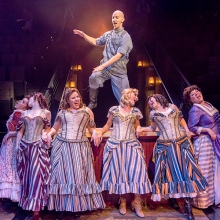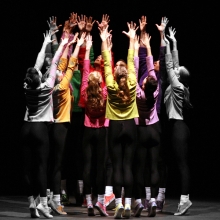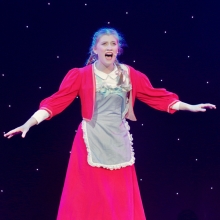Filichia Features: The Emperor’s New Clothes Looks Sharp

Filichia Features: The Emperor’s New Clothes Looks Sharp
Before Ragtime … before Seussical …
For that matter, wordsmith Lynn Ahrens and composer Stephen Flaherty wrote The Emperor's New Clothes before they tackled any of their other eight musicals.
The team was just starting out in the early '80s when they had the chance to create an hour-long version of the famous fairy tale. Hans Christian Andersen had created two swindlers who know that a narcissistic emperor's Achilles' heel is his penchant for fancy clothes. They tell His Majesty that they'll make a suit for him that only smart people can see; to others, it would seem invisible.
The con-men will only pretend to make the suit. They know that no one in the country will be willing to say "I'm a dumbbell! I see nothing!" And so, our monarch parades in the buff until a little kid blurts out "The emperor is naked!"
(Yes, youth -- not yet corrupted by the pretensions of the adult world - can be counted on to tell the truth.)
The Rhino Theatre in Pompton Lakes, NJ recently mounted a superb production thanks to director Greg Paradis and choreographer Greyson Gerdts. They showed that A&F were already doing solid work during their professional infancy. Ahrens repeated each important piece of information just enough times in dialogue and lyrics to ensure that no child would be left behind.
This emperor is decidedly different from Andersen's unnamed one. Emperor Marcus III (a charming Gregory Gwyn) is a mere 14, which allows the kids who attend to relate to him better. Marcus, unlike the pompous know-it-all in Andersen's tale, is nervous that he won't be able to do the job.
His subjects (the efficient Hayley Wolosz and Mariel Letourneau) expect "a leader as strong as a leader can be" but soon lose confidence in him when he doesn't know how to handle low wages, crippling taxes, big potholes and bigger floods. All these make Marcus more vulnerable to being easily bilked when Swindler (yes, only one of them) arrives.
Swindler (the oh-so-charismatic Rashad Davis) charms Marcus in "Magic Clothes," a soft-shoe that makes a hard sell easy. It's one of nine winning A&F songs. There's also a nifty one that involves charades, which both child and adult audience members always find funny.
I've seen over 11,000 shows and have become accustomed to the amount of applause a number usually gets. Here at Rhino, I noticed that the handclapping lasted a few seconds longer than usual - partly because of the worth of the songs and partly because of the performances.
A&F were wise to create Arno, The Scrub Boy (a role a female can play, as Natalya Kozlovski admirably did). Arno resembles Moliere's servants who are smarter than the people for whom they work.
The Emperor likes him, but advisor William (a drolly officious Jake Aboyoun) and Royal Seamstress Deena (a hilarious Mary Kate Portera) insist that he cannot possibly associate with someone of a much lower class.
Thus A&F gave the story extra resonance. Why can't people who like each other hang out together, no matter what their background?
"Don't be snobby" is actually stated. Here's hoping that the kids were able to process the story's famous message about not just following the crowd but making up their own minds. Better still, don't be afraid to express what you truly feel.
Finally, despite what Shakespeare and Mark Twain each alleged, the musical shows that clothes do not make the man. Seeing Marcus develop his confidence - with a little help from his friend Arno - reveals that intelligence and integrity are what really make the man.
Needless to say, Gwyn was not required to wear his birthday suit; having him emerge in his underwear was quite enough. Yet The Emperor's New Clothes will make demands of your costume designer and staff, what with all the medieval duds to create the right atmosphere.
There's one other requirement: Arno must do a cartwheel, for the show specifically calls for one. Fourteenth-century painter Giotto was said to be able to draw a perfect circle; Kozlovski rivaled that with her cartwheel.
A&F didn't include Andersen's second line from the original story. He stressed that the emperor was so clothes-obsessed that "he cared nothing about going to the theater."
So why would A&F eliminate that line? Perhaps they felt that the emperor's not liking theater would too quickly and indubitably tell the audience that the monarch was indeed a fool - and they had to save that for later in the show.
You may e-mail Peter at pfilichia@aol.com. Check out his weekly column each Monday at www.broadwayselect.com and Tuesday at www.masterworksbroadway.com . He can be heard most weeks of the year on www.broadwayradio.com.
Share
Callboard
-
Shake and shimmy it with the #Hairspray20Challenge! Join MTI and Broadway Media in celebrating 20 years of #Hairspray. Duet this here or find us on TikTok! Special thanks to @broadwaymedia and @jammyprod. Choreography Guides are a licensor official resource that provides step-by-step instruction from Broadway and professional choreographers for your productions! Visit @broadwaymedia to learn more. #mtishows #youcantstopthebeat #hairspraymusical #goodmorningbaltimore
View on Instagram

























